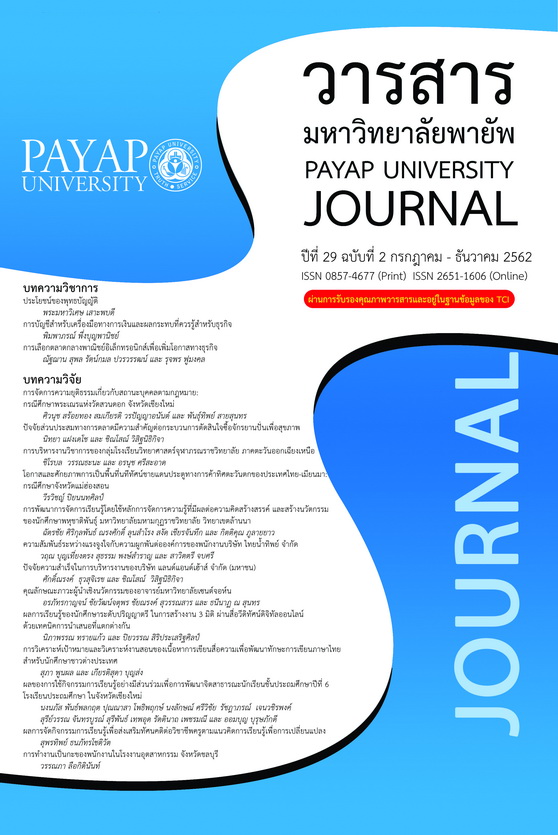ผลการจัดกิจกรรมการเรียนรู้เพื่อส่งเสริมทัศนคติต่อวิชาชีพครู ตามแนวคิดการเรียนรู้เพื่อการเปลี่ยนแปลง
Main Article Content
บทคัดย่อ
การศึกษานี้มีวัตถุประสงค์เพื่อศึกษาผลการจัดกิจกรรมการเรียนรู้เพื่อส่งเสริมทัศนคติต่อวิชาชีพครูตามแนวคิดการเรียนรู้เพื่อการเปลี่ยนแปลง การศึกษาในขั้นตอนแรกเป็นการทบทวนวรรณกรรมที่เกี่ยวข้องกับแนวคิดทฤษฎีการจัดการเรียนรู้เพื่อการเปลี่ยนแปลงของไทยและต่างประเทศ เพื่อนำไปพัฒนาเป็นกิจกรรมการเรียนรู้เพื่อส่งเสริมทัศนคติต่อวิชาชีพครูของนิสิตระดับปริญญาตรี ดำเนินการเก็บรวบรวมข้อมูลในภาคเรียนต้น ปีการศึกษา 2560 กับนิสิตระดับปริญญาตรี มหาวิทยาลัยพะเยา ชั้นปีที่ 1 สาขาวิชาภาษาไทย จำนวน 35 คน ได้มาจากการเลือกแบบเจาะจง เครื่องมือที่ใช้ในการเก็บรวบรวมข้อมูลได้แก่งานเขียนสะท้อนการเรียนรู้ การสังเกตพฤติกรรมในชั้นเรียน ละครสะท้อนการเรียนรู้ ผลการศึกษาพบว่า กิจกรรมส่งเสริมทัศนคติต่อวิชาชีพครูตามแนวคิดการเรียนรู้เพื่อการเปลี่ยนแปลงสามารถส่งเสริมทัศนคติเกี่ยวกับคุณลักษณะความเป็นครูใน 6 ด้าน ได้แก่ ความตระหนักถึงคุณค่าในวิชาชีพครู รู้สึกรักและศรัทธาในวิชาชีพครู ความสามารถหาทางแก้ปัญหาอุปสรรค การปรับตัวเพื่อจะอยู่กับผู้อื่นในสังคมได้อย่างมีความสุข กล้าแสดงความคิดเห็นและกล้าแสดงออก และการยอมรับและรับฟังผู้อื่น
Article Details
เอกสารอ้างอิง
ปราณี อ่อนศรี. (2558). บทบาทผู้สอนต่อทักษะการเรียนรู้ในศตวรรษที่ 21. วารสารพยาบาลทหารบก, 16(3), 8-13.
พัชรี ศรีสังข์. (2551). การพัฒนารูปแบบการจัดการเรียนรู้วิชาจิตวิทยาสังคมโดยใช้ชุมชนและประสบการณ์เป็นฐานเพื่อเสริมสร้างคุณลักษณะของบัณฑิตที่พึงประสงค์. วารสารพฤติกรรมศาสตร์, 14(1), 33-47.
ละเอียด แจ่มจันทร์, รวิภา บุญชูช่วย และ สุนีย์ อินทรสิงห์. (2557). การเรียนรูเพื่อการเปลี่ยนแปลง: ถอดบทเรียนจากการเรียนการสอนสาขาพยาบาลศาสตร์. วารสารพยาบาลกระทรวงสาธารณสุข, 24(3), 1-14.
วันทนีย์ นามสวัสดิ์, สิริวรรณ ศรีพหล และ กัญจนา ลินทรัตนศิริกุล. (2558). ผลการใช้จิตตปัญญาศึกษาเพื่อสร้างเสริมคุณลักษณะความเป็นครูสำหรับนักศึกษาคณะครุศาสตร์ มหาวิทยาลัยราชภัฏ วารสารบัณฑิตศึกษา มหาวิทยาลัยราชภัฏสกลนคร, 12(57), 7-20.
วิจารณ์ พานิช. (2558). เรียนรู้สู่การเปลี่ยนแปลง. กรุงเทพฯ: บริษัท เอส.อาร์.พริ้นติ้ง แมสโปรดักส์ จำกัด.
วิชญา ผิวคำ. (2553). กรณีศึกษารูปแบบการจัดการเรียนรู้บนพื้นฐานแนวคิดจิตตปัญญาศึกษาในอุดมศึกษา. วิทยานิพนธ์ปริญญามหาบัณฑิต สาขาวิชาวิจัยการศึกษา บัณฑิตวิทยาลัย จุฬาลงกรณ์มหาวิทยาลัย.
ศุภวรรณ วงศ์สร้างทรัพย์ และคณะ. (2555). ทัศนคติตอวิชาชีพครูของนิสิตคณะศึกษาศาสตรและพัฒนศาสตร มหาวิทยาลัยเกษตรศาสตร วิทยาเขตกำแพงแสน. วารสารสุขศึกษา พลศึกษา และสันทนาการ, 38(2), 36-48.
สมสิทธิ์ อัสดรนิธี และ สุปรียส์ กาญจนพิศศาล. (2561). การบ่มเพาะผู้นำการเปลี่ยนแปลงรุ่นใหม่ของชุมชนแอโก๋ –แสนคำลือด้วยกระบวนการเรียนรู้สู่การเปลี่ยนแปลงแนวจิตตปัญญาศึกษา. วารสารวิชาการมนุษยศาสตร์และสังคมศาสตร์ มหาวิทยาลัยบูรพา, 26(52), 96-118.
สำนักงานคณะกรรมการการศึกษาขั้นพื้นฐาน, องค์การยูนิเซฟ ประเทศไทย and Right to Play Thailand Foundation. (2560). ทักษะชีวิต รหัสครูในศตวรรษที่ 21. กรุงเทพฯ: ผู้แต่ง.
สุพรทิพย์ ธนภัทรโชติวัต และคณะ. (2558). การพัฒนารูปแบบการจัดประสบการณ์วิชาชีพครูเพื่อส่งเสริมคุณลักษณะครูในศตวรรษที่ 21. วารสารศึกษาศาสตร์ มหาวิทยาลัยนเรศวร, 17(1), 33-48.
อรนุช ลิมตศิริ. (2560). การศึกษานอกห้องเรียนเพื่อเสริมสร้างทักษะการเรียนรู้ในศตวรรษที่ 21. Veridian E-Journal, Silpakorn University, 10(3), 1643-1658.
อาภรณ์ ใจเที่ยง. (2550). หลักการสอน (ฉบับปรับปรุง) (พิมพ์ครั้งที่ 4). กรุงเทพฯ: โอเดียนสโตร์
Deveci, T. (2014). The Transformative Learning Experiences of Learners of English as a Foreign Language at a University Preparatory Programme. Transformative Dialogues: Teaching & Learning Journal, 7(3), 1-19.
Henderson, J. (2012). Transformative Learning: Four Activities that Set the Stage, Retrieved July 29, 2019, from https://www.facultyfocus.com/articles/online-education/transformative-learning-four-activities-that-set-the-stage/
Imel, S. (1998). Transformative learning in adulthood. ERIC Digest No. 200. ERIC Clearinghouse on Adult Career and Vocational Education Columbus, OH.
John P. Miller & Aya Nozawa. (2002). Meditating Teachers: a qualitative study. Journal of In-Service Education, 28(1), 179-192, DOI: 10.1080/13674580200200177.
Kaminski, J. (2011). Theory applied to informatics – Lewin’s Change Theory. CJNI: Canadian Journal of Nursing Informatics, 6(1), 1-5. Retrieved August 1, 2019, from http://cjni.net/journal/?p=1210.
Kitchenham, A. (2008). The Evolution of John Mezirow’s Transformative Learning Theory. Journal of Transformative Education, 6(2), 104-123.
Mezirow, J. (2003). Transformative learning as discourse. Journal of transformative Education, 1(1), 58-63.
Schein, E.H. (1996). Kurt Lewin's change theory in the field and in the classroom: Notes toward a model of managed learning. Systems practice, 9(1), 27-47.
Sherwood, G., & Horton-Deutsch, S. (2017). Reflective practice: Transforming education and improving outcomes (2nd ed.). Indianapolis: Sigma Theta Tau Press.


